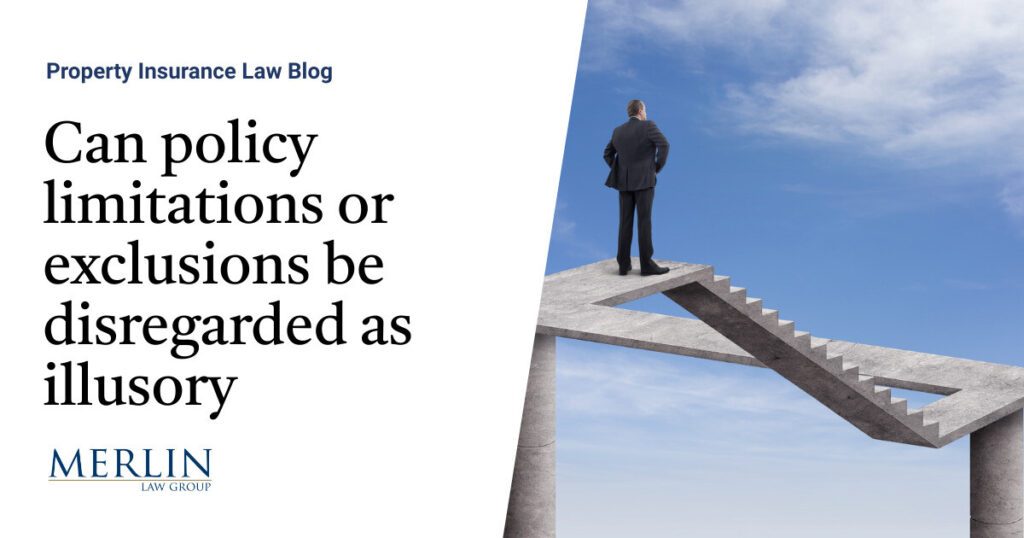Can policy limitations or exclusions be disregarded as illusory?

This question came up in the highly watched California Supreme Court case, John’s Grill v. Hartford. The doctrine of “illusory” coverage comes up from time to time in discussions but rarely, if ever, in case law. At least until recently, when a California appellate court thrust it front and center and applied it to a Covid-19 case. The California Supreme Court reversed the appellate court and explained, kind of, sort of, how the doctrine applies.
The decision as it relates to illusory coverage can be summed up in this sentence: “But even assuming some version of the doctrine may exist under California law, we conclude that an insured must make a foundational showing that it had a reasonable expectation that the policy would cover the insured’s claimed loss or damage. Such a reasonable expectation of coverage is necessary under any assumed version of the doctrine.” 1
Let’s start at the beginning. In John’s Grill, the insured, a restaurant, closed due to Covid-19. Its policy issued by Hartford excluded losses by virus unless resulting from specifically enumerated perils, including water, fire, wind, and lightning. The appellate court invalidated this “cause of loss limitation,” believing there was no realistic chance the insured, a restaurant, would have its property damaged by virus resulting from one of the enumerated perils. Because there was no “realistic chance” of coverage, the appellate court invalidated the “cause of loss limitation,” interpreting the policy as covering virus damage caused by any peril whatsoever. The California Supreme Court rejected this, however.
The supreme court’s primary reason for reversing was its disbelief that the provision, in fact, had no realistic chance of providing coverage to the insured. For the same reason, the court found that the cause of loss limitation in the virus provision had a single, plain and clear meaning and that the insured should have reasonably expected coverage to only apply when an enumerated peril is involved. The court cited examples from other cases where viruses were spread by wind and noted that virus-contaminated water could spread the virus onto raw or prepared food.
The court went on to address the entire concept of invalidating a policy limitation merely because it provides no realistic chance of coverage. The court explained that in its history, it has only invalidated unambiguous policy limitations in very limited scenarios, including when the provision restricts an insured’s reasonable expectation of coverage by language that is not plain, clear, or conspicuous and when it contradicts the efficient proximate cause doctrine set forth in Insurance Code 530. 2
Further, the court distinguished two of its past cases, as well as a note from a popular practice guide, where the concept of illusory coverage was applied. In those situations, however, whether a provision was illusory was discussed in the context of applying two well-established methods of policy interpretation: ambiguity and reasonable expectations. Ambiguities exist when the parties present two reasonable interpretations both for and against coverage, and the reasonable expectations doctrine limits how an insurer can take away coverage an insured reasonably expects. 3 For John’s Grill, the court found the language was not ambiguous, and there was only one reasonable expectation, as discussed above.
“Thus,” the court wrote, “even if we were to consider this line of thinking, John’s Grill would have to show it had a reasonable expectation of coverage for its pandemic-related losses. It has not. A reasonable insured would understand that virus coverage under the Limited Fungi, Bacteria or Virus Coverage endorsement was limited and would be available only if the virus resulted from certain causes.” 4
Finally, the court seemed to find John’s Grill’s theory of the illusory coverage doctrine to be a bit off-putting since it was up to John’s Grill to pick the coverage it wanted to buy:
John’s Grill could assess for itself whether it, specifically, was likely to benefit from the coverage based on the policy’s terms. The fact that John’s Grill’s particular business arrangements would make it unlikely to benefit from the policy’s limited virus coverage would be something for John’s Grill to consider when obtaining coverage. But even John’s Grill’s own conception of the illusory coverage doctrine is insufficient to justify disregarding the plain language of the policy. The Court of Appeal erred by holding otherwise. 5
1 John’s Grill, Inc. v. Hartford Fin. Servs. Grp., Inc., No. S278481, 2024 WL 3736798, at *1 (Cal. Aug. 8, 2024).
2 Id. at *7-8.
3 Id. at *8-9.
4 Id. at *10.
5 Id. at *11.







